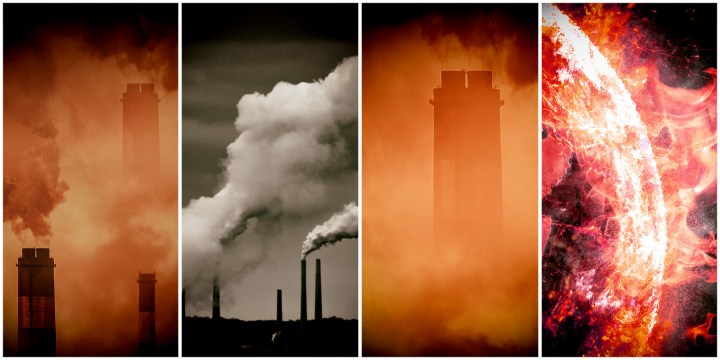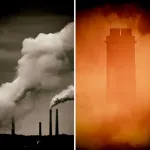FOSSIL FOLLY OP-ED
A gas dilemma for South Africa in the face of runaway climate change

‘Runaway’ is a phrase that rarely lends itself to positive outcomes. Runaway child, runaway train, runaway nuclear reaction; even the unlikely concept of a runaway kids’ party implies that someone — probably many someones — will come to a stickier-than-normal end for such an event.
When the UN’s Intergovernmental Panel on Climate Change’s (IPCC) reports start talking about the increasing risk of “runaway climate change” if the global temperature passes 1.5°C above the pre-industrial norm, it feels like perhaps the minimum threshold of mitigation action the world should be considering has been raised significantly compared to a year ago.
Monday’s release of the IPCC Working Group 3 report is the penultimate instalment — pending a Synthesis Report later this year — of the multi-authored, most dystopian book of the century so far.
These days, the IPCC AR6 trilogy describes a reality already experienced by many, and it feels as if some are beginning to resign themselves (cynically or pessimistically) to an inevitable future.
We must remember that the future is not yet written.
In the colourful analytical approach of Jon Richardson and the Futurenauts (@JANDTHEF), the outputs of the different IPCC reports have been described as, “What f**ked it?” (WG 1: how well physical science is able to describe and predict the drivers of and outcomes of climate change), “Exactly how f**ked is it?” (WG 2: the impacts of climate change and options for adapting to our tortured climate) and “How do we unf**k it?” (WG 3: mitigation options and trajectories for the world to stay below climate change of 1.5°C, 2°C and 4°C).
In sum then, we are now at the point where we know more precisely than ever when, how and even technically what to do to save ourselves from runaway climate change — but still not how to surmount the hurdles of politics and embedded political economy that keep the present locked into a dystopian trajectory.
The fact that the latest two reports have been released amid the largest global energy crisis of recent times — driven by a war that is already both destabilising the hard-earned international cooperation of the past decades and risking famines in vulnerable regions — is particularly poignant.
It’s as if we required some reminder of the value of the global integration that has brought us to this golden era of plenty (for some), and the fossil hydrocarbon source of the bountiful energy that fuelled it.
Restoring and building global integration will be critical for the survival of humanity — all the modelled climate scenarios with increasingly fragmented polity have much higher emissions and lower human wellbeing. At the same time, shifting to other alternative sources is essential to secure the continued productivity to sustain a global population estimated to peak at nearly 10 billion.
The most recent IPCC report (released on 4 April) highlights the various options available for mitigation at global, national and sectoral levels and clarifies that an energy-rich, low-carbon economy can indeed be achieved through concerted global action.
The world’s plangent cries for energy security being leveraged for increased fossil fuel consumption are better served by avoiding dependence on vulnerable supply chains for fossil fuels, and building out a comprehensive new interlinked and widely distributed renewable energy economy.
A newly published research report from the Tyndall Centre for Climate Research has examined the remaining carbon budgets for the century in line with the Paris Agreement, considering a key question: “How, within a given global emissions budget aligned with the Paris Agreement goals, could oil and gas production be differentially phased out in producer nations, while taking account of the principle of equity as embedded in the principle of common but differentiated responsibilities and respective capabilities?”
This is essentially the question for climate mitigation, and the findings are striking. For a 50% chance of staying under 1.5°C (good odds for a dollar bet, but shaky ground for existential gambles), the whole world must have steered away from coal use by 2040, with developed nations reaching that point by 2030.
Using the phrase “functional zero year” to highlight that a “net zero” target can only encompass emissions from (primarily) cement and a small amount of other unavoidable emissions, it goes further to highlight that we must be weaned entirely from fossil oil and gas by 2050. Most developed nations should make the shift away from oil and gas by 2034, with South Africa (not the lowest capacity of nations, but nevertheless on a strong developmental trajectory) stopping all production by 2045.
Importantly, these trajectories anticipate no expansion of production. In other words, even taking into account the historical and developmental fair shares, there is just no space for any nation to increase fossil fuel usage.
Similarly, a recent article in the prestigious journal Nature finds that oil and gas production must decline globally by 3% each year until 2050. This implies that most regions must reach peak production now or during the next decade, rendering many operational and planned fossil fuel projects unviable. Even the global energy planner extraordinaire, the International Energy Agency, has said in its net zero pathway that beyond projects already committed to as of 2021, no new oil and gas fields should be approved for development.
Does this mean global energy demand is not met and humanity needs to give up on its development objectives? No! Alternatives can fill the gaps, often more efficiently and more economically.
Whither then South Africa’s much-vaunted gas potential and political appetite for petroleum exploration?
From a climate perspective, it is clear that no new exploration should be taking place. South Africa is slipping towards the unenviable status of climate pariah due to its unremittingly heavy usage of coal. Beyond our commitments under the Paris Agreement, do we really want to move from being a coal-dependent climate victim to being a gas-dependent climate villain? Or be subject to the increasing likelihood of carbon border adjustment mechanisms when we try to export our products to the EU, UK and proactive climate early movers?
Even if we don’t care about our positioning in the global political milieu — or even the climate and its impact on our existence, and all we care about is domestic energy security and affordable and reliable electricity — is gas the way to achieve these important objectives? There is mounting research that gas is neither a necessary nor desirable part of South Africa’s near-term energy mix, and even less so in the longer term.
We all know South Africa is in an energy crisis, and fossil gas is often positioned as the way out of it.
If you can wait a decade or more to “fix” a crisis at any cost, then sure, gas might be an option. For those of us who’d like to see an end to load shedding soon, without the electricity tariffs spiralling out of control, we’d better look at alternatives.
The lead time to develop new gas resources is long — very long to develop indigenous resources, and just a bit less long to develop the infrastructure needed to import it. Even in Norway, the average lead time from a gas discovery to production is 16 years. Yes, that’s from discovery… never mind if you still have to find the stuff.
Add with the fabled (in)efficiency of the South African bureaucracy and popular resistance to exploration, it is likely to be even longer. Or never, as Shell and Rhino Energy have learnt the hard way. But even for located resources like Brulpadda and Luiperd, production could potentially start in the late 2030s, and could be allowed to continue for barely over a decade to still reach the net zero goal of 2050. This makes the financial feasibility of fossil gas very challenging unless it is sold at a very, very high price.
So if gas isn’t the solution to our current energy crisis, is it a necessary component of our energy future?
With each leap in renewables and energy storage technology, this looks less likely — and leaping they have been. In these gloomy times, the incredible advances in renewables’ conversion efficiencies and cost reductions, and the increasing suite of options of energy storage technologies, can only boost one’s optimism.
For most gas use cases, renewables-based alternatives are already cheaper — or will be in a few years, especially with SA’s world-leading renewable resource potential.
South Africa also has sufficient capital and technical expertise available to start implementing many of these alternatives immediately, and pretty much all of them have a much shorter implementation lead time.
A fresh-off-the-press study by the International Institute for Sustainable Development looked at whether South Africa should consider building gas-fired power stations and associated gas supply infrastructure, given the recent disruptive technological changes in the power sector.
Their analysis is not the first to show that for South Africa, the cheapest form of bulk electricity comes from renewables. Combined with battery storage with rapidly falling costs, they are also increasingly considered the lowest-cost option for new-build peaking capacity.
For grid balancing, there are many other cost-competitive methods that reduce the need for flexible and dispatchable generators until renewables represent in excess of 30% of our total electricity generation (we are currently at under 10%). The study concludes that South Africa may see significant negative outcomes from developing a large gas-to-power system now.
It is worth noting that this analysis was carried out before the prices of gas skyrocketed on the back of the war in Ukraine, and the conclusion is only more valid now.
With the weak case for the power sector to fulfil the fossil gas “anchor off-taker” role in South Africa, it will be interesting to see if industrial gas advocates would still find the fuel as attractive if they had to absorb the costs associated with the necessary infrastructure investment to expand gas utilisation themselves. It is telling in this light to see what the proposed subsidisation of fossil fuels that a government-led gas expansion therefore represents, even as libertarian economists call for renewables to stand on their own.
The long and the short of it is this: the economic case for new gas projects along the whole supply chain — from exploration (especially for exploration) and right down to distribution infrastructure is fast evaporating, due to a combination of climate policies and the emergence of cleaner alternatives. This means that any gas production and distribution capacities South Africa might invest in — at home or abroad — will be subject to considerations of shorter lifespans, making them likely to end up either as stranded assets or a white elephant that will be kept on life support with taxpayers’ money.
While outright climate denialism is so 2016, the fossilised elite’s new calls of, “everyone agrees that we must address climate change, but we must balance that against developmental needs”, together with “gas is a climate-friendly fuel that will allow our continued development”, are disingenuous in the extreme.
All the scientific evidence, as collated, translated and presented through the IPCC’s reports says that 1) without addressing climate change there will be no development in the long term and 2) fossil gas needs to be phased out, not phased in.
Development and climate change action are not counterweights to be finely balanced in the actions of the political hurly-burly. Climate change action is development, and development without considering climate change is essentially just providing profits to an empowered elite at the expense of the whole of humanity.
Putting climate justice at the centre of an accelerated transition programme for a low-carbon and equitable economy is therefore the only developmental trajectory that South Africa, and the world, can afford.
Anything else will run away with our futures. DM
James Reeler and Tjaša Bole-Rentel work on climate issues with WWF South Africa.



















 Become an Insider
Become an Insider
Comments - Please login in order to comment.